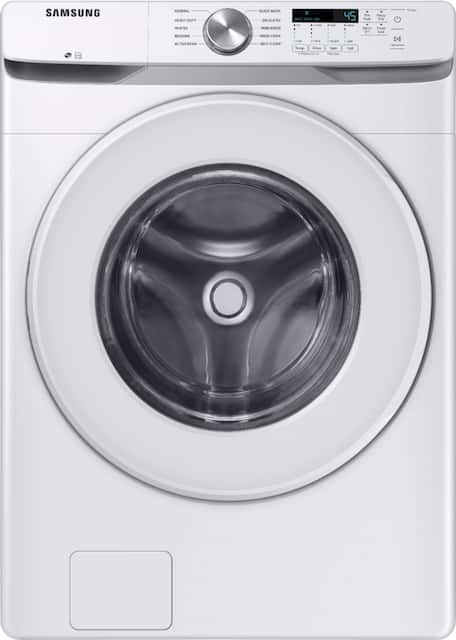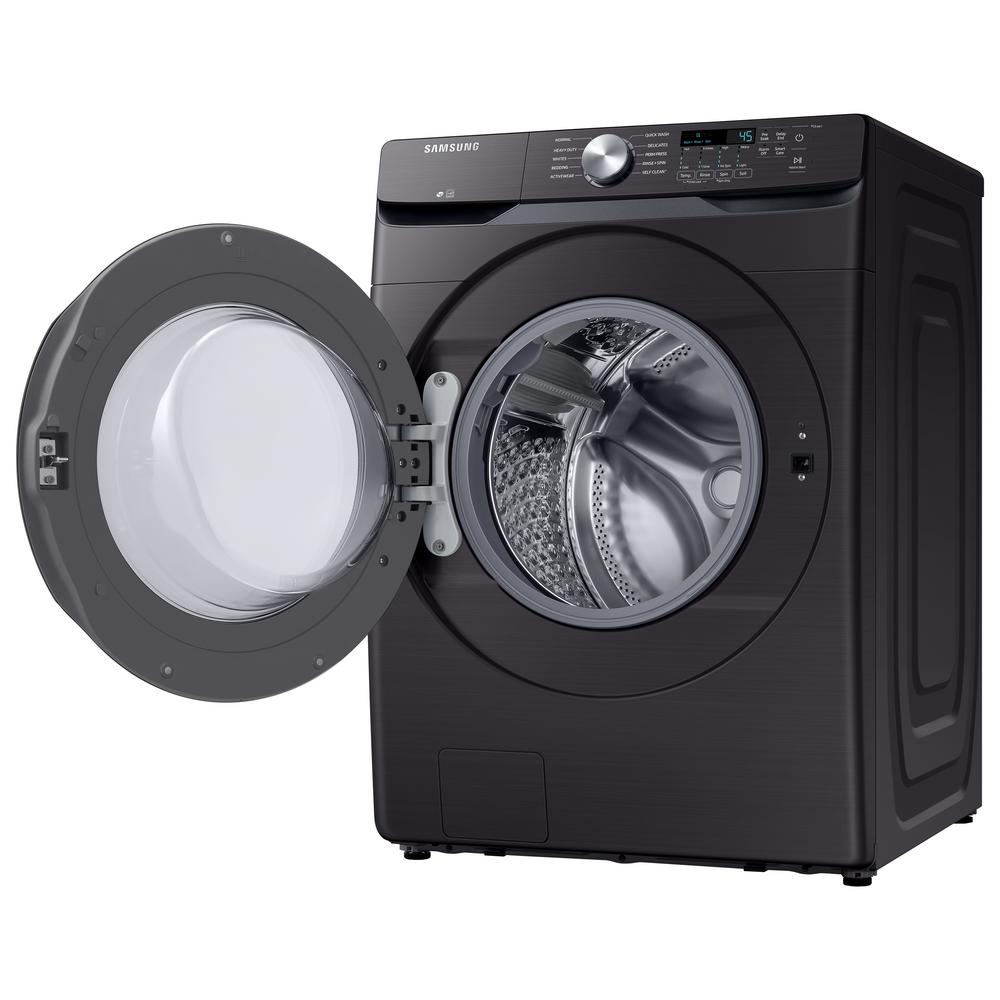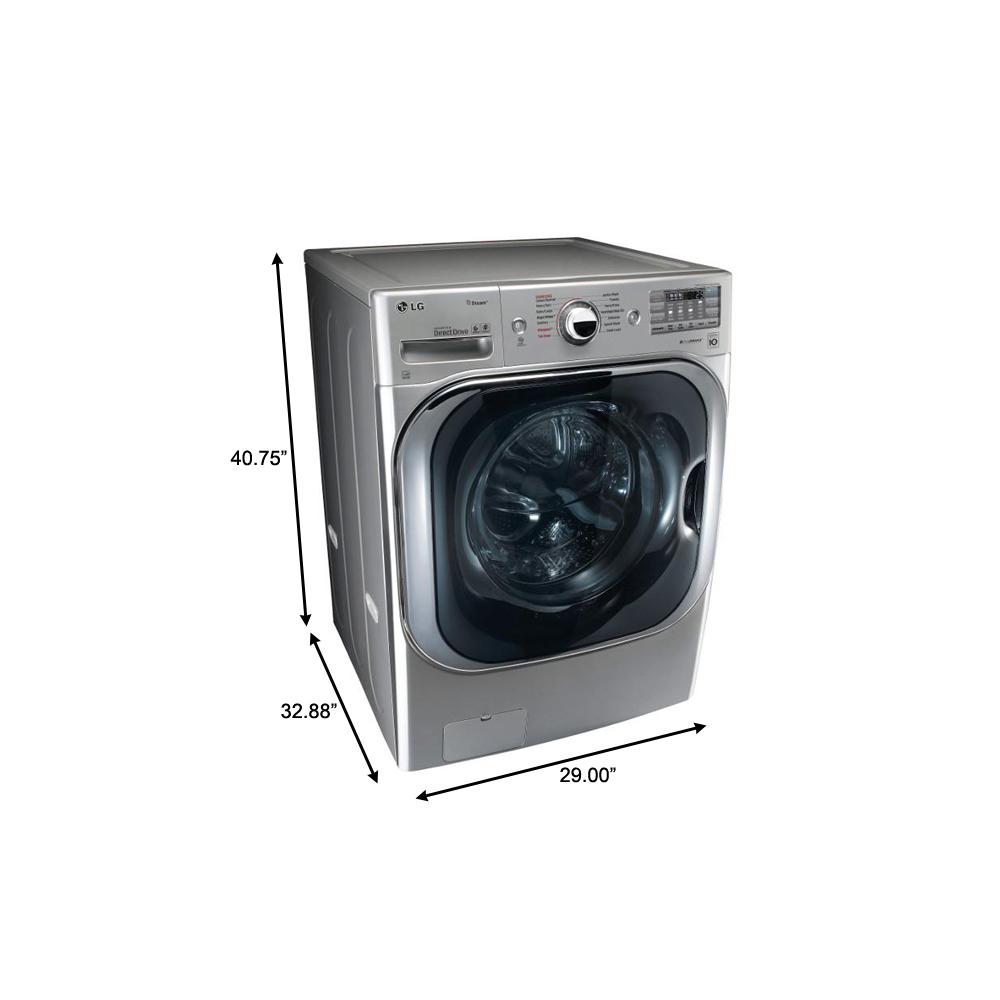Samsung – 4.5 cu. ft. 5-Cycle Front Load Washer with Vibration Reduction Technology+ – White
Samsung’s Energy Star® Certified Front Load washer has 4.5 cu. ft. capacity to fit more in every load and cut down on laundry time. It is equipped with Vibration Reduction Technology+ to reduce noise for quiet washing and features Self Clean+ to eliminate 99% of bacteria that can form in the drum.
Additional information
| Product Height | 38 3/4 inches |
|---|---|
| Product Width | 27 inches |
| Product Depth | 31 3/8 inches |
| Depth With Door Open | 52 11/16 inches |
| Capacity | 4.5 cubic feet |
4 (four) is a number, numeral and digit. It is the natural number following 3 and preceding 5. It is a square number, the smallest semiprime and composite number, and is considered unlucky in many East Asian cultures.
5 (five) is a number, numeral and digit. It is the natural number, and cardinal number, following 4 and preceding 6, and is a prime number.
Humans, and many other animals, have 5 digits on their limbs.
Samsung Group (Korean: 삼성; Hanja: 三星; RR: samseong [samsʌŋ]; stylised as SΛMSUNG) is a South Korean multinational manufacturing conglomerate headquartered in Samsung Digital City, Suwon, South Korea. It comprises numerous affiliated businesses, most of them united under the Samsung brand, and is the largest South Korean chaebol (business conglomerate). As of 2024, Samsung has the world's fifth-highest brand value.
Samsung was founded by Lee Byung-chul in 1938 as a trading company. Over the next three decades, the group diversified into areas including food processing, textiles, insurance, securities, and retail. Samsung entered the electronics industry in the late 1960s and the construction and shipbuilding industries in the mid-1970s; these areas would drive its subsequent growth. Following Lee's death in 1987, Samsung was separated into five business groups – Samsung Group, Shinsegae Group, CJ Group, Hansol Group, and JoongAng Group.
Samsung industrial affiliates include Samsung Electronics, Samsung Heavy Industries, Samsung Engineering and Samsung C&T Corporation. Other subsidiaries include Samsung Life Insurance and Cheil Worldwide. Notable Samsung industrial affiliates include Samsung Electronics (the world's largest information technology company, consumer electronics maker and chipmaker measured by 2017 revenues), Samsung Heavy Industries (the world's second largest shipbuilder measured by 2010 revenues), and Samsung Engineering and Samsung C&T Corporation (respectively the world's 13th and 36th largest construction companies). Other notable subsidiaries include Samsung Life Insurance (the world's 14th largest life insurance company), Samsung Everland (operator of Everland Resort, the oldest theme park in South Korea) and Cheil Worldwide (the world's 15th largest advertising agency, as measured by 2012 revenues).
Technology is the application of conceptual knowledge to achieve practical goals, especially in a reproducible way. The word technology can also mean the products resulting from such efforts, including both tangible tools such as utensils or machines, and intangible ones such as software. Technology plays a critical role in science, engineering, and everyday life.
Technological advancements have led to significant changes in society. The earliest known technology is the stone tool, used during prehistory, followed by the control of fire—which in turn contributed to the growth of the human brain and the development of language during the Ice Age, according to the cooking hypothesis. The invention of the wheel in the Bronze Age allowed greater travel and the creation of more complex machines. More recent technological inventions, including the printing press, telephone, and the Internet, have lowered barriers to communication and ushered in the knowledge economy.
While technology contributes to economic development and improves human prosperity, it can also have negative impacts like pollution and resource depletion, and can cause social harms like technological unemployment resulting from automation. As a result, philosophical and political debates about the role and use of technology, the ethics of technology, and ways to mitigate its downsides are ongoing.
Vibration (from Latin vibrāre 'to shake') is a mechanical phenomenon whereby oscillations occur about an equilibrium point. Vibration may be deterministic if the oscillations can be characterised precisely (e.g. the periodic motion of a pendulum), or random if the oscillations can only be analysed statistically (e.g. the movement of a tire on a gravel road).
Vibration can be desirable: for example, the motion of a tuning fork, the reed in a woodwind instrument or harmonica, a mobile phone, or the cone of a loudspeaker.
In many cases, however, vibration is undesirable, wasting energy and creating unwanted sound. For example, the vibrational motions of engines, electric motors, or any mechanical device in operation are typically unwanted. Such vibrations could be caused by imbalances in the rotating parts, uneven friction, or the meshing of gear teeth. Careful designs usually minimize unwanted vibrations.
The studies of sound and vibration are closely related (both fall under acoustics). Sound, or pressure waves, are generated by vibrating structures (e.g. vocal cords); these pressure waves can also induce the vibration of structures (e.g. ear drum). Hence, attempts to reduce noise are often related to issues of vibration.
Machining vibrations are common in the process of subtractive manufacturing.
Washer most commonly refers to:
- Washer (hardware), a thin usually disc-shaped plate with a hole in the middle typically used with a bolt or nut
- Washing machine, for cleaning clothes
Washer may also refer to:
- Dishwasher, a machine for cleaning dishware, cookware and cutlery
- Dishwasher (occupation), a person who cleans dishware, cookware and cutlery
- Washer, a person with obsessive-compulsive disorder who washes her/his hands compulsively
- Washer method, a mathematical formula for finding volume
- Washer pitching, an outdoor game involving tossing discs at a target
White is the lightest color and is achromatic (having no hue). It is the color of objects such as snow, chalk, and milk, and is the opposite of black. White objects fully reflect and scatter all the visible wavelengths of light. White on television and computer screens is created by a mixture of red, blue, and green light. The color white can be given with white pigments, especially titanium dioxide.
In ancient Egypt and ancient Rome, priestesses wore white as a symbol of purity, and Romans wore white togas as symbols of citizenship. In the Middle Ages and Renaissance a white unicorn symbolized chastity, and a white lamb sacrifice and purity. It was the royal color of the kings of France as well as the flag of monachist France from 1815 to 1830, and of the monarchist movement that opposed the Bolsheviks during the Russian Civil War (1917–1922). Greek temples and Roman temples were faced with white marble, and beginning in the 18th century, with the advent of neoclassical architecture, white became the most common color of new churches, capitols, and other government buildings, especially in the United States. It was also widely used in 20th century modern architecture as a symbol of modernity and simplicity.
According to surveys in Europe and the United States, white is the color most often associated with perfection, the good, honesty, cleanliness, the beginning, the new, neutrality, and exactitude. White is an important color for almost all world religions. The pope, the head of the Roman Catholic Church, has worn white since 1566, as a symbol of purity and sacrifice. In Islam, and in the Shinto religion of Japan, it is worn by pilgrims. In Western cultures and in Japan, white is the most common color for wedding dresses, symbolizing purity and virginity. In many Asian cultures, white is also the color of mourning.
With or WITH may refer to:
- With, a preposition in English
- Carl Johannes With (1877–1923), Danish doctor and arachnologist
- With (character), a character in D. N. Angel
- With (novel), a novel by Donald Harrington
- With (album), a 2014 album by TVXQ
- With (EP), a 2021 EP by Nam Woo-hyun






by Michael
Live on the second floor. I love Samsung washer and dryers, this is my second set. Great vale for the price, quite and smooth even on heavy loads and lots of wash options.
by Nomie
I have had no complaints about this washer. As a matter of fact we had a house fire and the washer was damaged and I’m going to replace it with the same model.
by Julio
I purchased the stackable washer and dryer which I found very useful, convenient, very good quality and reasonable.
by Gary
I do like the multiple extra rinse and temperature options. The unit does seem to spin more water out of the laundry as the dryer does not run as long. Only thing i continue to not like is the leaking from the front with every wash.
by Fergie
Excellent washer. I am using quite a bit less laundry soap and my water bill went down.
by Mike
The Best Buy Team Delivered the machine and was very helpful by removing the shipping bolts for me. As for the machine, I love it.